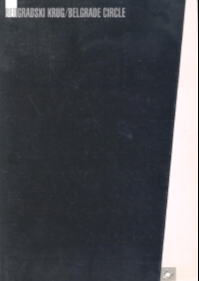
We kindly inform you that, as long as the subject affiliation of our 300.000+ articles is in progress, you might get unsufficient or no results on your third level or second level search. In this case, please broaden your search criteria.


Some African tribes believe that birds in their ignorance can see the hidden star-lit sky together with the sunshine. It seems that only that kind of birds' view can reach for a part of the truth. I used that view in writing my book of political essays about Yugoslavia, titled YU-tlantide. By using such a view, I would like to tell you something about the position of a writer in Serbia today. I will try to remain unbiased and the most I can give you are a few personal reflexions. You must draw your own conclusions.
More...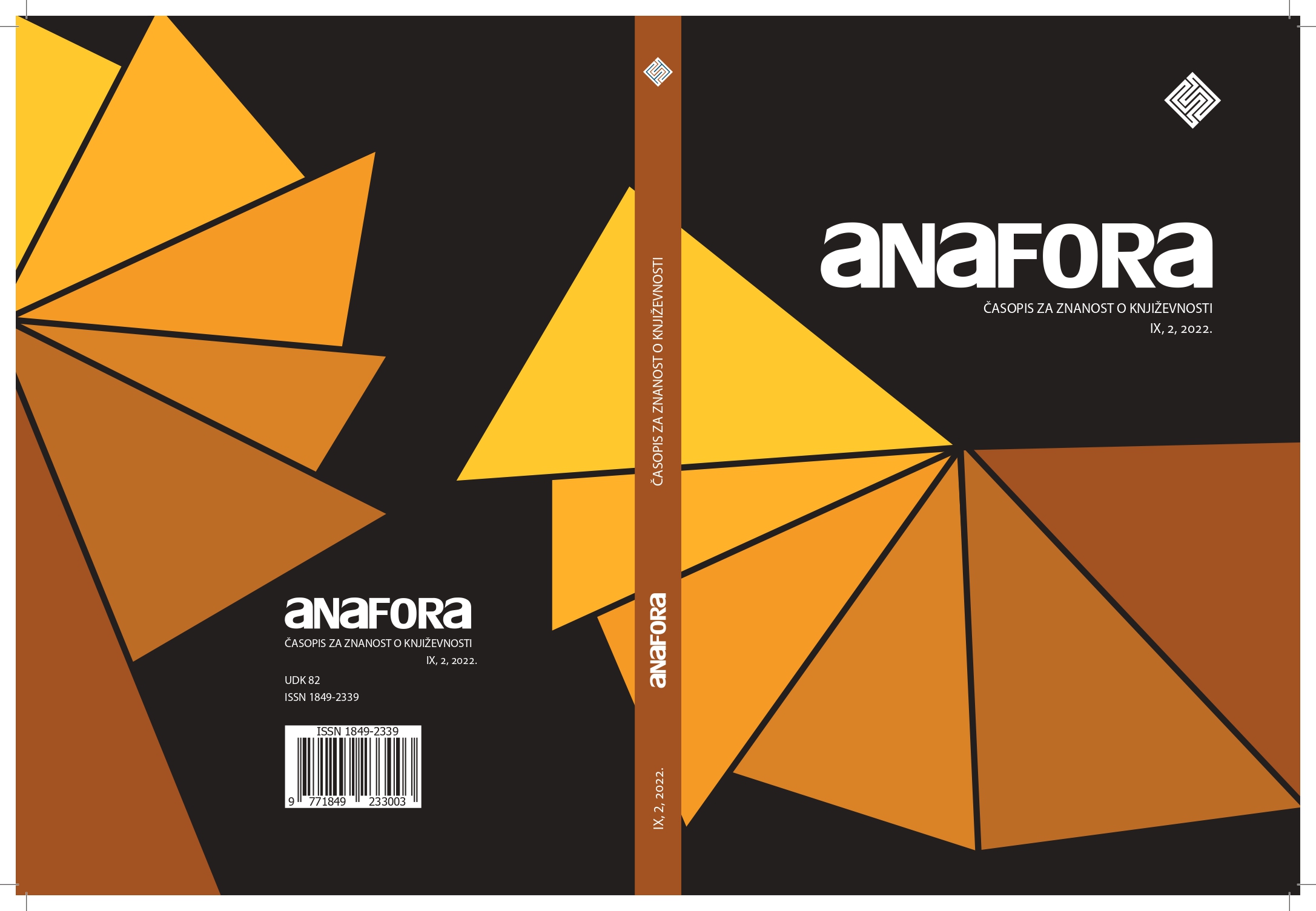
The aim of this article is to analyse Constantine P. Cavafy’s poems on death with the help of theoretical and hermeneutical literary principles and the interplay of the Greek words sema (“a grave”) and soma (“the body”). The aim is to study their forms and symbolisms as one of the fundamental motifs of Cavafy’s oeuvre. Simultaneously, the article will compare the poetic symbols with ancient philosophy on death (exemplified by Plato), as well as with the later authors’ (for instance, Stephane Mallarme’s) symbolistic considerations of death, which inspired Cavafy’s, modern, poetry. Through a textual analysis of his poetry on death, the poet’s influence and the sense of destruction he arouses in the reader will be explored. Furthermore, the article will focus on the thymotic power of his poetry, arguing that this author of historical heritage—that is, of the inheritance of Eros inheritance—is also an author of the inheritance of Thanatos.
More...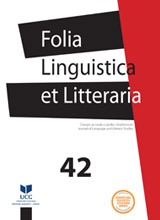
Over recent decades, judgments as a legal genre have received increased attention from linguists. Such a trend has contributed to a better understanding of the macro-and micro-linguistic aspects of this highly complex legal genre. However, the pragmatic aspects of judgments as a specific text type remain largely neglected in the current literature. Therefore, this paper aims to contribute to this line of research by discussing the pragmatic effects arising from the use of meta-argumentative verbs in a corpus of judgments delivered by the European Court of Human Rights (ECHR judgments, henceforth). Accordingly, the paper will show that the pragmatic effects of the recurrent meta-argumentative verbs in ECHR judgments can be analysed through the prism of politeness and legitimization strategies. In addition, suggestions will be provided regarding the ways in which corpus data can be used for raising learners’ awareness of the nuanced language that is pertinent to juridical settings.
More...
The 10th of august 2021 marks the 100th anniversary of Ion Negoițescu’s birth. During his stage in the Sibiu Literary Circle and in the literary activity that followed the separation of the group, Negoițescu’s writing distinguishes itself by revealing a very strong personality, severe in his critical judgement, who made a significant contribution to the overall image of the Romanian literature, despite a bio-bibliographical destiny haunted by hazards. Irony is a fundamental part of his critical and ideological ammunition. The purpose of this article is to identify the role and the consequences of irony in his literary activity, to pinpoint the types of literature and writers that the critic mocks, to observe the rhetoric and weapons of his irony. In order to analyse the types and the roles of Negoițescu’s irony, one has to consider the author’s studies of literary history, his autobiographical writings, literary journalism and his epistolary activity.
More...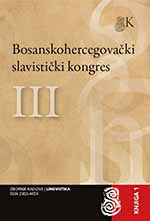
The paper describes numbers in the Sarajevo dialect of older speakers and connects them with those from the neighboring dialects. Numbers are a non-independent type of word, which in the process of language development lost its declension forms and some numbers became immutable, some partially changeable, and some, again, declinate completely. The conducted research shows that in Sarajevo speech the number one of the main numbers is variable, the numbers two, three and four appear in the basic (N/A) form, while the other main numbers are unchanged (with the exception of the noun hiĺada). Aggregate numbers also show a tendency to lose case suffixes. Ordinal numbers have a pronoun-adjective change and forms of all genders and both numbers.
More...
Refugees, asylum seekers and asylum holders as foreign language students present a particularly vulnerable group of students and the approach to language teaching should be adapted to their needs and specifics (Đurđević and Podboj 2017). Their language training is the first condition for integration into a new society and inclusion in the labor market, and in this process one of the most important roles is played by state institutions and educational institutions. From the 2017–2018 academic year, Croaticum – Center for Croatian as a second and foreign language at the Faculty of Humanities and Social Sciences in Zagreb has been offering a Croatian language course for asylum seekers and asylum holders. Also, in the 2018–2019 winter semester, a new elective course Croatian as L2 and Service Learning was held at the Department of Croatian Language and Literature. In this article, these two examples of good practice will be described and the role of the (non)institutional organization in language training courses for refugees will be discussed. In the final part, the competencies of the teachers involved in teaching Croatian or refugees will also be addressed.
More...
Bosnian language and literature is a school subject studied from the first grade of the elementary school to the end of the secondary education and it is a communicative foundation for the acquisition of content from other subjects, but also for communication in general. For this reason, it is necessary to motivate students in the best way to acquire the content of the subject at Bosnian language classes and to encourage them to learn independently. Motivation is a driving force for all students’ activities, therefore it is an indispensable and necessary part of every lesson in teaching mother tongue; a prerequisite for success of every teaching unit, so every teacher seeks to find the best way to motivate pupils and identify the most successful motivational procedures. This topic is interesting because in the Bosnian language teaching methodology there is almost no research on this methodological, pedagogical and psychological problem. The paper examines the motivation of students in the elementary school to adopt the Bosnian language and literature subject content in order to gain knowledge about the attitudes and opinions students about the motivation to learn Bosnian. Using the methods of theoretical analysis and synthesis, the compilation method, the descriptive and the survey method, we examined the attitudes of students about various motivational factors related to internal and external motivation. We also found a difference in attitudes of sixth and ninth grade elementary school students in relation to gender and age, and the extent to which the knowledge acquired in Bosnian language classes has a motivating effect on the independent acquisition of new knowledge.
More...
In primary education in Macedonia, teaching is organized, in addition to Macedonian, in Albanian, Turkish, Serbian and Bosnian languages, while in secondary education, in addition to Macedonian, Albanian and Turkish language (according to the research Образование на јазиците на малубројните етнички заедници, 2020), i.e. in the school year 2020/2021 there was an opportunity to use Serbian as the language of instruction in the high school in Kumanovo (according to: СРЕДНОШКОЛЦИТЕ МОЖЕ ДА ИЗБЕРАТ ДА УЧАТ НА ТУРСКИ ЈАЗИК ВО 11 УЧИЛИШТА ВО ЗЕМЈАВА, И НА СРПСКИ ВО ЕДНО – Сакам Да Кажам (sdk.mk)). According to the legislation and the curriculum for the nine-year primary education for the academic year 2020/2021 (Bureau for Development and Promotion of Upbringing and Education), it can be noticed that the subject Macedonian Language for students from other communities starts from the fourth grade – 72 hours (4th, 5th, 8th and 9th grade) and 108 hours (6th and 7th grade) per year. Our analysis will focus on this subject. On the one hand, textbooks for the subject Macedonian Language for students from other communities will be reviewed, and, on the other hand, our thoughts regarding the Macedonian language as the second, i.e. as the language of the environment in which this target group of students lives, will be provided.
More...
The paper describes in detail the univerbation as a somewhat neglected formative process of creating new words in the Bosnian language. Based on the examples of univerbs with the meaning of clothing and footwear found in conversational and journalistic style (as well as two examples in literary style) it describes the formative, stylistic and normative aspect of univerbs with the meaning of clothing and footwear. The analyzed examples of univerbs, as well as the two-part syntagmas from which they are derived, demonstrate whether and when language tends to linguistic economy and expressiveness.
More...
Nominalisation (turning verbs – actions or events – into nouns – things, concepts or people) in language is the occurrence that nominal/noun constructions occur in a sentence instead of verbs. Hence, instead of the expected verb predicate, the speaker uses some of the phrasal verbs or the verb noun (gerund) instead of a transitive verb. In the linguistic practice, constructions such as make mistake are used instead of mistake, make a decision instead of decide, give speech instead of speak, lead debate instead of debate, ask questions instead of question... This phenomenon is, as a rule, characteristic of the administrative style (constructions such as making changes, submitting a report, expressing pleasure, etc.), and it is increasingly represented in journalism, but it is also more and more presented in the conversational style, where it is not natural to use such constructions. So this phenomenon is also taking place in contexts where it is really excessive. – we often hear a car mechanic repairing, not repairing a car, a dentist does a tooth extraction, does not extract a tooth, an athlete performs a shot and does not kick... As a rule, decomposition is mainly used when we want to avoid giving information about the doer of the action, or to emphasize anonymity. The use of nominated statements relates to situations and spheres of communication in which static, impersonal, abstract information is presented, while the action, the specific doer of the action, the conditions under which the action takes place are less relevant. Although nominalising and decomposing of predicates are not linguistic phenomena that are negative and wrong, we should still be careful using nominalised constructions, and I recommend when it is possible to use transitive verbs insted of phrasal verbs or gerund.
More...
The historical development of the Croatian language during the 18th century is the most interesting period in terms of language standardization. Numerous experts and standardologists of the Croatian language debate on this topic from many different points of view and interpret differently the beginning of standardization of the Croatian language. Some consider it to be the middle of the 18th century (Brozović), others place it at the beginning of the 17th century (Oczkowa). Literary works such as catechisms reflect changes in the historical development of the Croatian language. So far, they have not been sufficiently researched from a linguistic standpoint. The usage of catechisms as Catholic literature and their use and printing in major publications during the 18th and 19th centuries in areas where Croatian was read (including Bosnia and Herzegovina) testify to their readability and popularity, and this also reflected the use of some catechisms printed in the 18th century which were read in schools until the end of the 19th century (Babuša). It is also interesting that catechisms written in Croatian with the dominance of one of the spoken idioms were read and used in schools dominated by another Croatian idiom. Some linguistic studies on catechisms suggest that some were written with a dialectic idiom (Moguš, Kolenić). This points to a certain role of catechisms in Croatian literature, and then to the historical development of the Croatian language in the prestandard period in relation to the norm and normization of the Croatian terminology. The example of three names (sobstvo, zlamenje, ponukovati) shows how one can prove a lexical norm in a historical context.
More...
There is a significant number of loanwords in the Bosnian language and they are an indispensable part of the vocabulary. We are interested in loanwords from Romance languages. Furthermore, in the following text they are given appropriate individual names specifying the country of origin. The main corpus of researched loanwords is the dictionary of Bosnian language named Rječnik bosanskoga jezika. In order to collect information about speakers and their ability to recognize loanwords from languages they know and speak, I have conducted a sociolinguistic research. We have offered two questionnaires – for French and Italian speakers, while there was not sufficient data for Spanish and Portuguese to process. Moreover, the research was conducted from the perspective of sociolinguistics, a discipline that joins language and society. The essential features of this discipline help us to better perceive certain phenomena in language and the outcome of the questionnaire. We observed the influence of the society on language and reactions of the respondents, in this case the speakers. The final part of the questionnaire, more precisely, the results, will be presented in this paper. The paper also permeates the author’s expectations and compares the expected with the obtained. The research is based on the study of the behavior of individuals using a questionnaire as a scientific tool, the result of which will give the final judgment. Questionnaires find their theoretical basis in the subject of research which are loanwords in the language and these questionnaires are designed in a way to receive feedbacks from the respondents on the possibility of recognizing origin of a lexeme in their mother tongue that comes from the foreign language they speak. Additionally, the paper examines the influence of social context on the speaker, whether and to what extent the society around us can change our consciousness and whether it could directly affect language skills.
More...
Throughout the university education, the most common individual work required from students is writing seminar papers. Although it has not been clearly defined to which type of discourse those texts belong to, according to the available literature, they are often considered as academic discourse. However, some authors use the term academic writing as a special type of discourse that includes various types of student papers written at undergraduate, graduate and postgraduate studies (including essays, reports, seminar papers, etc.). This paper investigates the features of academic discourse using the example of student seminar papers, and it focuses on the basic strategies of academic discourse, spelling and grammar errors, lexicon, and text formatting mechanics (mechanics of writing punctuation marks, physical appearance mechanics and mechanics of citation). The research covers 100 student seminar papers written by second year graduate students of preschool education in academic years 2018/2019, 2019/2020 and 2020/2021 (fall semester).
More...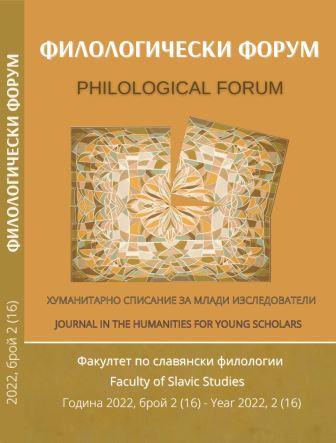
This paper examines a typical process of French phonology by virtue of which the height of the mid vowel in an unstressed open syllable agrees in height with the word-final vowel. Often called “vowel harmony”, this gradient phenomenon in French is not a proper height harmony, but a process of vowel-to-vowel coarticulation. However, vowel harmony is considered to be the diachronic result of the phonologization of V-to-V coarticulation. Thus, this paper discusses the possibility that this allophonic process evolves towards a categorial one.
More...
This paper presents some variations regarding pe marking and clitic doubling in Old Romanian. Our corpus consists of original documents from the 17th and 18th centuries. We notice that the marker pe is usual with [+human] direct objects, especially with proper names and personal pronouns. The relative care is used mainly without the marker pe. Clitic doubling is a more inconsistent phenomenon, particularly in the case of the postverbal object realised by a common or a proper noun. A frequent pattern is the double realisation of the pronominal clitic attested in the context of analytical verb forms
More...
This paper is dedicated to etymological doublets in French. The purpose is to group existing words in French according to their common origin and to propose a new typology of these groups of words. The majority of the cases studied are words with Latin origin but there are also some examples from other languages. A related issue which is addressed are the loanwords and the socio-historical factors which determine the language development
More...
The article examines the role of the printing press in the stabilisation of a unified norm for written Italian in the 15th and 16th centuries. The printing industry first impressed the urgency of such a norm, and then became a “megaphone” for one of the sides in the so called questione della lingua (language problem): a discussion about what form the national Italian language should have. In a situation of linguistic fragmentation on the peninsula, Venetian publishers used the laws of the market, educating their readers in certain rules of the written language, thus contributing to the imposition of Dante, Petrarch and Boccaccio’s Tuscan language from the 14th century as a model of written Italian. Thus, we observe the importance of the diamesic variable (related to the communication mode or channel) highlighted in general and in the work of the intellectual Pietro Bembo in particular
More...
This article studies four cases, covered by the media, of sexist insults in French politics that occurred between 2007 and 2019 (the Devedjian, Sido, Aubert and Ravier cases). Using the original concept of “insultance sexiste”, the author applies sociolinguistics and discourse analysis to a corpus to further explore the multitude of close relationships between norms and insults. This perspective proposes to broaden linguistic research on insult by integrating all occurrences of linguistic sexism in line with the thesis that “any sexist statement is legitimately insulting”.
More...
In the report, I present the meeting with the Bulgarian author Georgi Gospodinov, which took place in the city of Napoli, hosted by the University of studies L’Orientale. During the meeting and presentation of his latest novel, Timeshelter (2021, Italian edition), a various number of topics were discussed: from the concept of time, to the youth’s hope for a better future and the impact of such a controversial, prophetic, novel
More...